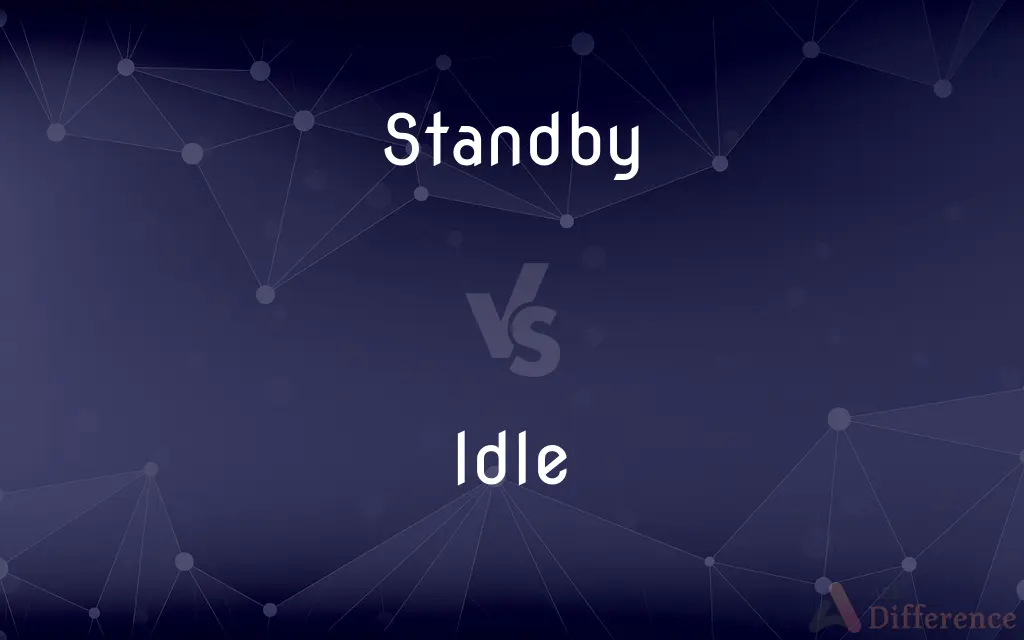Standby vs. Idle — What's the Difference?
By Tayyaba Rehman & Maham Liaqat — Updated on April 29, 2024
Standby refers to a state where a device or system is ready to activate or operate instantly upon command, whereas idle describes a condition where a device or system is operational but not currently engaged in any tasks.

Difference Between Standby and Idle
Table of Contents
ADVERTISEMENT
Key Differences
In the context of electronics or machinery, standby mode indicates readiness to perform a function with minimal delay, often using minimal power to maintain this readiness. On the other hand, an idle state means the device or system is turned on and consuming more power than in standby, but it is not performing productive tasks.
Standby is typically a more energy-efficient state compared to idle, as devices are designed to reduce power consumption to the lowest possible level while still being able to respond quickly to user input. In contrast, while idle, devices might still run background processes or maintain higher levels of operational readiness.
For example, a television in standby mode might only be waiting for a signal from the remote control to turn on, using very little energy. Meanwhile, an idle computer may still be running background applications or updates, thus using more power than when in standby.
Technological devices like printers and scanners use standby to remain ready for immediate action without fully powering down, which can extend the life of the device by reducing wear from frequent power cycles. Idle modes, however, are more common in scenarios where quick resumption of activity is expected, such as with computers or industrial machinery.
Both modes aim to balance energy efficiency with convenience, but standby is generally preferable for long periods of non-use due to its lower power consumption, while idle is more suited for brief intervals between active use.
ADVERTISEMENT
Comparison Chart
Power Consumption
Minimal, optimized for energy saving
Higher than standby, lower than active
Operational State
Ready to activate instantly
Operating without performing main tasks
Common Usage
TVs, gaming consoles, home appliances
Computers, machinery
Efficiency
High energy efficiency
Less efficient than standby
Purpose
Maintain quick response capability
Maintain operation without full activity
Compare with Definitions
Standby
A low-power mode for electronic devices.
The laptop was on standby overnight to receive updates.
Idle
Consumes more energy than standby but less than during active use.
The computer was idle, with only the screensaver running.
Standby
Designed to conserve energy while staying ready for use.
He left the television in standby mode to quickly turn it back on with the remote.
Idle
A state where a device is on but not actively being used.
The engine was idling while he waited at the red light.
Standby
Often involves minimal display or no display activity.
Her phone's screen turned off but it was still in standby, ready to receive calls.
Idle
Useful for quick transitions back to active use.
The idle copier quickly started copying once the start button was pressed.
Standby
Common in household and office electronics.
The microwave’s clock remains visible even when it's in standby mode.
Idle
Often used to refer to machinery or vehicles.
The factory machines were idle during the lunch break.
Standby
Devices in standby can activate quickly.
The printer wakes up from standby as soon as a print job is sent.
Idle
May still run background processes.
Her email client updated while her computer was idle.
Standby
One that can always be relied on, as in an emergency.
Idle
Not employed or busy
Idle carpenters.
Standby
One kept in readiness to serve as a substitute.
Idle
Disinclined to work or be active; lazy
“a man who could seem idle, ignorant, even incompetent, yet was able to understand and to express ... the instincts, good and bad, of the American majority” (Godfrey Hodgson).
Standby
A mode of operation for a computer, television, or other electronic device in which the power is on and the device is ready for immediate use.
Idle
Not in use or operation
Idle hands.
Idle mills.
Standby
Kept in reserve for use when needed
A standby generator.
Idle
(Sports) Not scheduled to play a game
Both teams played today but will be idle tomorrow.
Standby
Of, relating to, or waiting for unreserved travel space that is made available by an airline only shortly before departure
Standby passengers.
Idle
Being a period of time in which there is little or no activity
Passed idle hours watching TV.
Standby
On a standby basis
Flew standby to New York.
Idle
Lacking substance, value, or basis
Idle speculation.
Idle threats.
Standby
A state of readiness without immediate involvement; remaining in preparation for (a sudden or unforeseen event or situation).
The troops were on standby in case of an attack.
Idle
To pass time without being engaged in purposeful activity
“The girls idled all day long, sending their tinkling laughter flowing up and down the street” (Alai).
Standby
(electronics) sleep mode
Idle
To move slowly or without purpose
“I drove past the workshop ... I idled along the driveway past the pole fence ... to Tyhee Road” (Tom Spanbauer).
Standby
(travel) Waiting at the airport in the hope of getting a seat on a flight that is already booked out.
Idle
To run at a slow speed or out of gear. Used of a motor or motor vehicle.
Standby
Something that is standard, well-tested, or frequently used.
That recipe is an old standby, and she keeps the ingredients around in case of unexpected guests.
Idle
To pass (time) without doing anything
Idle the afternoon away.
Standby
To wait briefly, as for additional communication by radio or telephone; stand by
Standby while I check that for you.
Idle
To make or cause to be unemployed or inactive
Layoffs that idled 1,000 factory workers.
A plant that was idled by a strike.
Standby
Something that can be relied on when needed
Idle
To cause (a motor, for example) to idle.
Standby
An actor able to replace a regular performer when required
Idle
A state of idling. Used of a motor vehicle
An engine running quietly at idle.
Standby
Ready for emergency use;
A standby generator
A standby crew
Idle
A mechanism for regulating the speed at which an engine runs at rest
Set the idle higher to keep the motor from stalling.
Idle
(obsolete) Empty, vacant.
Idle
Not being used appropriately; not occupied; (of time) with no, no important, or not much activity.
Idle hours
My computer hibernates after it has been idle for 30 minutes.
Idle
Not engaged in any occupation or employment; unemployed; inactive; doing nothing in particular.
Idle workmen
Idle
Averse to work, labor or employment; lazy; slothful.
An idle fellow
Idle
Of no importance; useless; worthless; vain; trifling; thoughtless; silly.
An idle story;
Idle talk;
Idle rumor
Idle
(obsolete) Light-headed; foolish.
Idle
(transitive) To spend in idleness; to waste; to consume.
Idle
(intransitive) To lose or spend time doing nothing, or without being employed in business.
To idle in an IRC channel
Idle
(intransitive) Of an engine: to run at a slow speed, or out of gear; to tick over.
Idle
(mechanical engineering) The lowest selectable thrust or power setting of an engine.
Idle
(gaming) An idle animation.
Idle
(gaming) An idle game.
Idle
Of no account; useless; vain; trifling; unprofitable; thoughtless; silly; barren.
Every idle word that men shall speak, they shall give account thereof in the day of judgment.
Down their idle weapons dropped.
This idle story became important.
Idle
Not called into active service; not turned to appropriate use; unemployed; as, idle hours.
The idle spear and shield were high uphing.
Idle
Not employed; unoccupied with business; inactive; doing nothing; as, idle workmen.
Why stand ye here all the day idle?
Idle
Given rest and ease; averse to labor or employment; lazy; slothful; as, an idle fellow.
Idle
Light-headed; foolish.
Idle
To lose or spend time in inaction, or without being employed in business.
Idle
To spend in idleness; to waste; to consume; - often followed by away; as, to idle away an hour a day.
Idle
Run disconnected or idle;
The engine is idling
Idle
Be idle; exist in a changeless situation;
The old man sat and stagnated on his porch
He slugged in bed all morning
Idle
Not in action or at work;
An idle laborer
Idle drifters
The idle rich
An idle mind
Idle
Without a basis in reason or fact;
Baseless gossip
The allegations proved groundless
Idle fears
Unfounded suspicions
Unwarranted jealousy
Idle
Not in active use;
The machinery sat idle during the strike
Idle hands
Idle
Silly or trivial;
Idle pleasure
Light banter
Light idle chatter
Idle
Lacking a sense of restraint or responsibility;
Idle talk
A loose tongue
Idle
Not yielding a return;
Dead capital
Idle funds
Idle
Not having a job;
Idle carpenters
Jobless transients
Many people in the area were out of work
Common Curiosities
How does idle mode affect device lifespan?
Idle mode may contribute to slightly increased wear and energy use but allows for quicker resumption of tasks than turning a device off.
What is the environmental impact of standby and idle modes?
While both modes consume more energy than turning a device off, standby is generally more energy-efficient than idle, contributing less to overall energy waste.
Why would a device be left in idle rather than standby?
A device might be left in idle if it needs to perform updates, run background processes, or be ready for immediate active use.
What is the main benefit of standby mode?
The main benefit of standby mode is energy conservation while maintaining readiness for immediate activation.
Can all devices use standby mode?
Most modern electronic devices have a standby mode, especially those designed for frequent on-off cycles.
What industries primarily use idle mode?
Industries such as manufacturing and transportation frequently use idle mode for machinery and vehicles to allow quick reactivation.
Which mode is recommended for long periods of non-use?
Standby mode is recommended for long periods of non-use due to its lower power consumption.
Can standby and idle modes be customized on a device?
Many devices allow users to customize power settings, including adjusting the behavior of standby and idle modes.
Is it better to shut down a device or leave it in standby?
For short periods, standby is often more convenient and energy-efficient, but for extended periods without use, shutting down is better.
How do standby and idle modes impact utility costs?
Both modes increase utility costs compared to turning a device off; however, standby generally uses less power than idle, leading to lower costs.
Share Your Discovery

Previous Comparison
Mumbai vs. Bombay
Next Comparison
Gharial vs. CaimanAuthor Spotlight
Written by
Tayyaba RehmanTayyaba Rehman is a distinguished writer, currently serving as a primary contributor to askdifference.com. As a researcher in semantics and etymology, Tayyaba's passion for the complexity of languages and their distinctions has found a perfect home on the platform. Tayyaba delves into the intricacies of language, distinguishing between commonly confused words and phrases, thereby providing clarity for readers worldwide.
Co-written by
Maham Liaqat















































